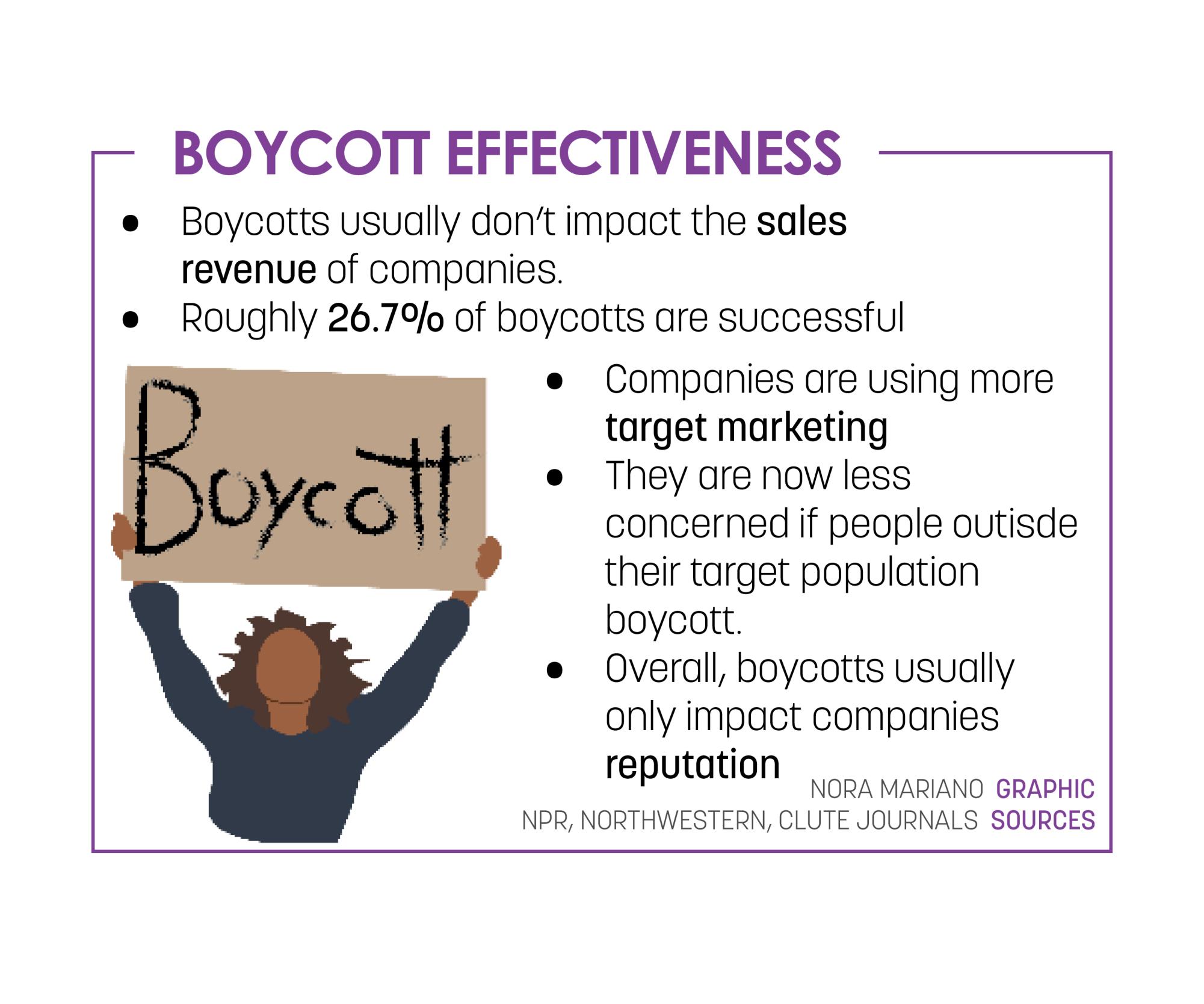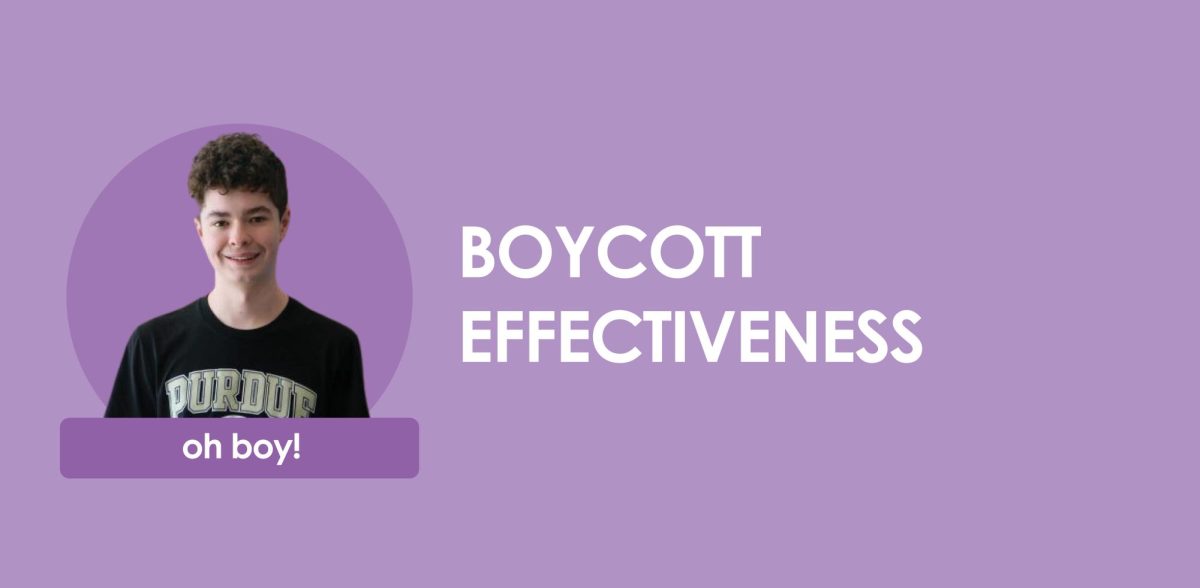Boycotts have been a staple of American history and have had positive results throughout the 20th century. Boycotts against the anti-semetic newspaper The Dearborn Independent led to the paper’s end (even though auto tycoon Henry Ford ran the publication). Likewise, bus boycotts in Montgomery, Alabama led to the integration of Montgomery buses, which was an important development in the Civil Rights Movement.
However, with the rise of social media a growing number of people seem to share one opinion: boycotts do not work and boycotts are a waste of time and money. This idea was shown when Northwestern’s Kellogg school of marketing reported that boycotts rarely impact a company’s bottom line. Due to reports similar to Kellog’s, there is this new idea of corporations being basically all-powerful beings, unable to be removed from the daily life of a consumer. While hashtags such as #boycottCompanyX and #boycottCompanyY seems to trend on sites like X (formerly Twitter) every day, the companies never seem to take any large hits.

But despite this widespread idea of boycotts being ineffective, the United States just saw two of the most successful boycotts in decades. Members of the conservative right-wing in June, enraged at Target for selling pride merchandise, simply refused to shop at Target. Target’s in store sales dropped by 5.4%, while the store’s online sales dropped by almost 11%, costing the company billions of dollars in potential revenue. Another successful right-wing boycott happened earlier this year with Bud Light after the company paid transgender influencer Dylan Mulvaney to advertise its products. Sales for the beverage dropped by 28%. While these two boycotts had their roots in bigotry and political extremism, they both proved boycotts can be successful when multiple people partake in them. These boycotts also showed corporations are not more powerful than the consumer.
Today, multiple boycotts rage on against some of the most wealthy American corporations. Chevron, Amazon and Starbucks have all been affected due to their exploitation of workers, negative impacts on the earth’s climate and political stances in the Israeli and Palestinian conflict. It is extremely easy to participate in a boycott against these corporations. Don’t like Amazon? Shop at Target or Walmart. Don’t want to support Starbucks? Brew your own coffee or go to a local coffee shop. While the loss of a couple of consumers may seem like it only causes a small dent, a dent is all that is needed sometimes to create meaningful change.
To put it simply, you should not just stand idle while you see a company going against your own beliefs; boycotts still work and can still serve as a way for consumers like you to share dissatisfaction with corporate policies.
















































































![Review: “The Immortal Soul Salvage Yard:” A criminally underrated poetry collection [MUSE]](https://hilite.org/wp-content/uploads/2025/03/71cju6TvqmL._AC_UF10001000_QL80_.jpg)
![Review: "Dog Man" is Unapologetically Chaotic [MUSE]](https://hilite.org/wp-content/uploads/2025/03/dogman-1200x700.jpg)
![Review: "Ne Zha 2": The WeChat family reunion I didn’t know I needed [MUSE]](https://hilite.org/wp-content/uploads/2025/03/unnamed-4.png)
![Review in Print: Maripaz Villar brings a delightfully unique style to the world of WEBTOON [MUSE]](https://hilite.org/wp-content/uploads/2023/12/maripazcover-1200x960.jpg)
![Review: “The Sword of Kaigen” is a masterpiece [MUSE]](https://hilite.org/wp-content/uploads/2023/11/Screenshot-2023-11-26-201051.png)
![Review: Gateron Oil Kings, great linear switches, okay price [MUSE]](https://hilite.org/wp-content/uploads/2023/11/Screenshot-2023-11-26-200553.png)
![Review: “A Haunting in Venice” is a significant improvement from other Agatha Christie adaptations [MUSE]](https://hilite.org/wp-content/uploads/2023/11/e7ee2938a6d422669771bce6d8088521.jpg)
![Review: A Thanksgiving story from elementary school, still just as interesting [MUSE]](https://hilite.org/wp-content/uploads/2023/11/Screenshot-2023-11-26-195514-987x1200.png)
![Review: "When I Fly Towards You", cute, uplifting youth drama [MUSE]](https://hilite.org/wp-content/uploads/2023/09/When-I-Fly-Towards-You-Chinese-drama.png)
![Postcards from Muse: Hawaii Travel Diary [MUSE]](https://hilite.org/wp-content/uploads/2023/09/My-project-1-1200x1200.jpg)
![Review: "Ladybug & Cat Noir: The Movie," departure from original show [MUSE]](https://hilite.org/wp-content/uploads/2023/09/Ladybug__Cat_Noir_-_The_Movie_poster.jpg)
![Review in Print: "Hidden Love" is the cute, uplifting drama everyone needs [MUSE]](https://hilite.org/wp-content/uploads/2023/09/hiddenlovecover-e1693597208225-1030x1200.png)
![Review in Print: "Heartstopper" is the heartwarming queer romance we all need [MUSE]](https://hilite.org/wp-content/uploads/2023/08/museheartstoppercover-1200x654.png)




